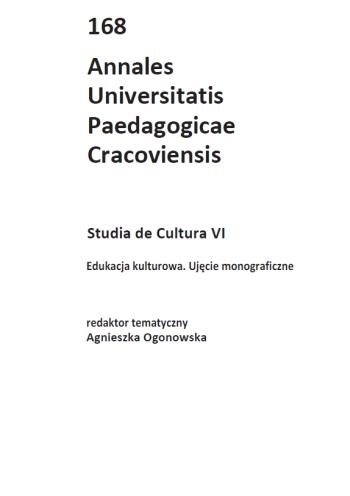Abstract
Polish studies formal education and the gender issue
In this article I want to show the relationship between the phenomenon of the gender reproduction and Polish philology formal education (state, conditions through a network of ministerial documents) at the high school stage. A significant part of the article refers to the mechanisms of reproduction in general knowledge, which is the basis for the belief that the interpretation of literary texts and the subject teacher's attitude affects the reproduction of gender norms. At the outset, I am presenting the tests' results of the year 2011, relating to the institutional determinants of educational processes, to then move to propose a model of reading taking into account such categories, as: gender, sexuality, otherness etc. I assume that this interpretation should be a multidimensional reading, open to the flow of meaning, against the symbolic violence and context.
References
Abramowicz M. (red.) (2011), Wielka nieobecna – o edukacji antydyskryminacyjnej w systemie edukacji formalnej w Polsce. Raport z badań, Warszawa: Towarzystwo Edukacji Antydyskryminacyjnej.
View in Google Scholar
Benzen D. (red.) (2003), Podstawowe pojęcia pedagogiczne, Berlin–Szczecin: Wydawnictwo Mater.
View in Google Scholar
Bernstein B. (1990), Odtwarzanie kultury, Warszawa: PIW.
View in Google Scholar
Błajet P. (2006), Ciało jako kategoria pedagogiczna. W poszukiwaniu integralnego modelu edukacji, Toruń: Wydawnictwo UAM.
View in Google Scholar
Bourdieu P., Passeron J.C. (1990), Reprodukcja. Elementy teorii nauczania, Warszawa: Państwowe Wydawnictwo Naukowe.
View in Google Scholar
Butler J. (2008), Uwikłani w płeć. Feminizm i polityka tożsamości, Warszawa: Wydawnictwo Krytyki Politycznej.
View in Google Scholar
Czerepniak-Walczek M. (2012), Pedagogika emancypacyjna, Gdańsk: GWP.
View in Google Scholar
Duszak A. (1998), Tekst, dyskurs, komunikacja międzykulturowa, Warszawa: PWN.
View in Google Scholar
Foucault M. (1995), Historia seksualności, Warszawa: Czytelnik.
View in Google Scholar
Foucault M. (1998), Nadzorować i karać. Narodziny więzienia, Warszawa: Aletheia.
View in Google Scholar
Giroux H.A., Witkowski L. (2010), Edukacja i sfera publiczna. Idee i doświadczenia pedagogiki radykalnej, Kraków: Impuls.
View in Google Scholar
Gmerek T. (2008), Edukacja i nierówności społeczne, Kraków: Impuls.
View in Google Scholar
Goffman E. (2000), Człowiek w teatrze życia codziennego, Warszawa: Wydawnictwo KR.
View in Google Scholar
Holmes M. (2007), What is Gender?, [w:] “Sociological Approaches”, London: Sage.
View in Google Scholar
Hryciuk R.E., Kościańska A. (red.) (2007), Gender. Perspektywa antropologiczna, Warszawa: Wydawnictwo Uniwersytetu Warszawskiego.
View in Google Scholar
Iwasiów I. (2004), Gender dla średniozaawansowanych. Wykłady szczecińskie, Warszawa: Wydawnictwo WAB.
View in Google Scholar
Jemielniak D. (red.) (2012), Badania jakościowe. Podejścia i teorie [oraz] Metody i narzędzia, Warszawa: Wydawnictwo Naukowe PWN.
View in Google Scholar
Kochanowski J. (2004), Fantazmat zróżnicowany. Socjologiczne studium przemian tożsamości gejów, Kraków: Universitas.
View in Google Scholar
Kochanowski J. (2009), Spektakl i wiedza. Perspektywa społecznej teorii queer, Łódź: Wschód-Zachód.
View in Google Scholar
Mizielińska J. (2004), (De)Konstrukcje kobiecości. Podmiot feminizmu a problem wykluczenia, Gdańsk: Wydawnictwo Słowo/obraz terytoria.
View in Google Scholar
Mizielińska J. (2007), Płeć (ciało) seksualność. Od feminizmu do teorii queer, Kraków: Universitas.
View in Google Scholar
Skowronek B. (1999), O dialogu na lekcjach w szkole średniej. Analiza pragmatyczno-językowa, Kraków: Wydawnictwo Naukowe AP.
View in Google Scholar
Sporek P. (2008), Szkolna klientela, „Nowa Polszczyzna” 2008, nr 1.
View in Google Scholar
Stoch M. (2009), Michel Foucault na lekcjach języka polskiego w szkole średniej. Seksualna prowokacja czy konieczność nowego języka interpretacji?, [w:] Gender-Queer-Edukacja, red. B. Skowronek, Kraków: Mellow sp. z o.o. Szkudlarek T., Śliwierski B. (1992), Wyzwania pedagogiki krytycznej i antypedagogiki, Warszawa: Impuls.
View in Google Scholar
Szkudlarek T., Śliwierski B. (1993), Wiedza i wolność w pedagogice amerykańskiego postmodernizmu, Kraków: Impuls.
View in Google Scholar
Dijk, T.A. van (1981), Discourse Studies and Education, “Applied Linguistics”, 2.
View in Google Scholar
Dijk, T.A. van (2001), Badania nad dyskursem, [w:] Dyskurs jako struktura i proces, red. T. A. van Dijk, Warszawa: Wydawnictwo Naukowe PWN.
View in Google Scholar
WHO, What do we mean by “sex” and “gender”?, http://www.who.int/gender/whatisgender/en/ (dostęp: 4.05.2014).
View in Google Scholar

